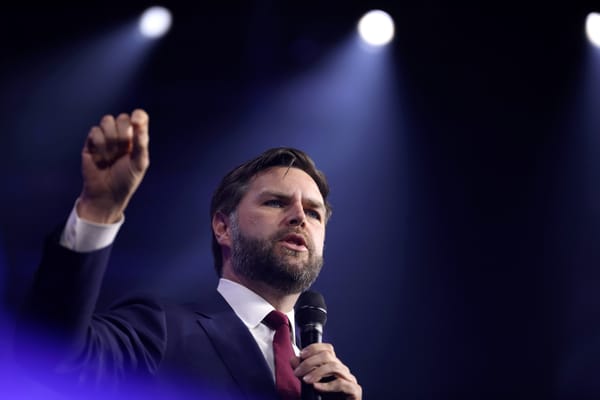The most surreal aspect of American political life today is that it unfolds under the looming shadow of war with a nuclear Russia, yet most of us manage to pretend that everything is normal. We focus on domestic squabbles—Haitian migrants in Ohio, IVF in Alabama, a flower ceremony at Arlington National Cemetery—as if we aren’t sleepwalking into a direct NATO-Russian confrontation with the potential to end the world as we know it.
J.D. Vance deserves praise for refusing to ignore this existential possibility and at least trying to forestall Revelation times. Last week, the Republican veep nominee outlined a peace plan to bring the Ukraine conflict to an end—and was promptly rewarded by the media and foreign-policy establishment with accusations of carrying water for the Kremlin and trying to impose his will on Kiev.
Nonsense. In light of some of their post-convention missteps, Vance’s (and Trump’s) determination to bring peace to Eastern Europe is their campaign’s most attractive proposition. Bigly attractive to anyone, like me, who awakes to news of the latest escalatory step from the Biden administration thinking to himself: In the name of all that is holy, can we please not do this?
Under the Vance plan, it would be up to Kiev and Moscow to mutually figure out “what a peaceful settlement looks like,” as he told an interviewer. The Russians would retain at least some of the territory they have taken, with a demilitarized buffer zone established between the two and the Ukrainian side heavily fortified against further aggression from Moscow. An independent Ukrainian state would endure on the other side of the DMZ, but “it doesn’t join NATO, it doesn’t join some of these sort of allied institutions.”
“All else being equal, Ukraine simply can’t win this thing.”
I don’t know if this is correct in every respect. Nor can I say with confidence that the two warring sides would agree to every dimension of the Vance peace plan. But it should be seen as a reasonable starting point for negotiations by anyone who (A) views the Russian state as a rational actor, (B) recognizes that, all else being equal, Ukraine simply can’t win this thing, and (C) worries about what it would mean for all else not to be equal.
Hawks in Washington and Brussels clearly accept the first proposition: that the Russian state is a rational actor operating on the basis of old-school national-interest calculations. If Western capitals really viewed Vladimir Putin as a Hitler 2.0 bent on subjugating Europe, they would be going into full mobilization mode. But they aren’t, which tells us that their rhetoric suggesting otherwise is just that.
Meanwhile, the general thrust of the conflict and the failure of the Ukrainian counteroffensive have vindicated what critics of escalation warned of from the conflict’s earliest days: namely, that all else being equal, Ukraine can’t win an industrial war against a power like Russia, given its shortcomings in artillery and manpower. Press-ganging another 10,000 Ukrainian geezers won’t change this dynamic.
Which brings us to the third proposition: that seeking a situation in which all else is not equal is frankly insane. Yet that is exactly what Team Biden is contemplating in authorizing Kiev to strike deep inside Russian territory using US-guided missiles that, as Christopher Caldwell warned in these pages last week, could only be operated with American assistance. Such action, Putin has said, would amount to an open and direct conflict between the collective West and Russia, the state with the world’s largest arsenal of strategic weapons.
So what’s the only rational alternative? A negotiated settlement in which Kiev and Moscow make mutual concessions: a neutral but fortified Ukraine, some land gains for Russia. The remaining details are to be worked out by diplomats.
Our domestic disputes matter a great deal, to be sure. What Vance is rightly telling us, however, is that a potential conflict with Russia would foreclose the possibility of our contesting issues like immigration and abortion. Unless Kamala Harris and Tim Walz signal a rethink on endless, mindless escalation against Russia, Team No Apocalypse will remain attractive to many millions of Americans who dread the sight of mushroom clouds billowing over Europe in the 21st century.
